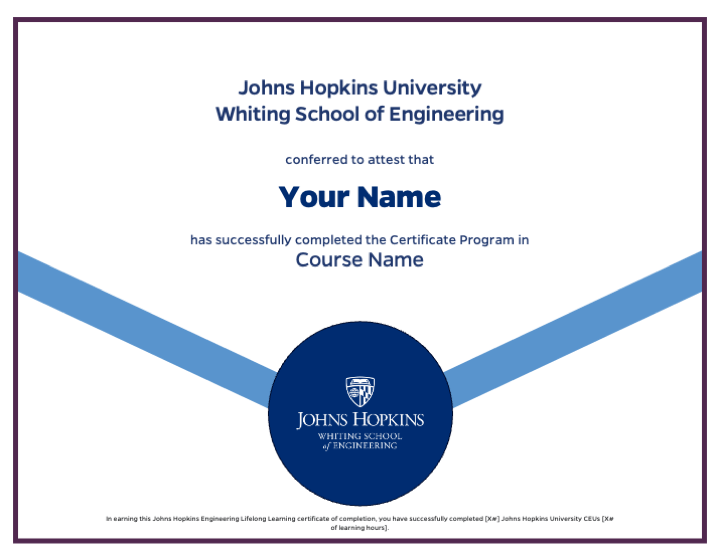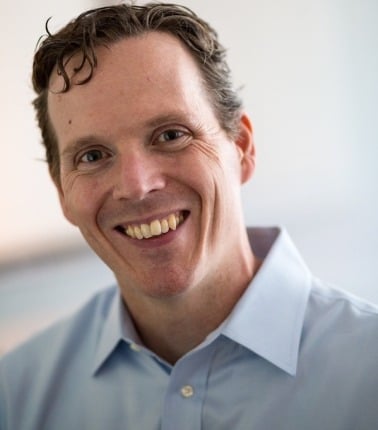Explore the World of Artificial Intelligence
Artificial Intelligence (AI) is revolutionizing industries, reshaping workflows, and creating new opportunities for innovation. Whether you are new to AI or looking to understand its broader impact, this one-day course is designed to provide you with a solid foundation in AI concepts, real-world applications, and responsible integration strategies.
In partnership with JHU Data Science and AI Institute (DSAI).
![]() Next course offering is June 11, 2025. Investment: $1400
Next course offering is June 11, 2025. Investment: $1400

June 11, 2025 • Johns Hopkins Homewood Campus, Imagine Center • 8:30am–4:00pm • In Person: $1400 • Online: $1000
Earn a certificate of completion from JHU, a recognized leader in education and research. Earn 1 Continuing Education Units (CEUs) upon course completion.

The AI for Everyone course from Johns Hopkins Engineering Lifelong Learning is an interactive workshop for JHU faculty, staff, and external professionals seeking to understand AI’s transformative potential. With no technical experience required, participants will explore key AI principles, ethical considerations, and emerging trends shaping industries such as business, healthcare, and education.
Through engaging discussions, case studies, and group exercises, you will gain practical insights into AI’s impact on society and walk away with actionable knowledge to integrate AI into your personal and professional life.
This program is designed for JHU faculty, staff, and external professionals who want to gain a foundational understanding of AI, its real-world applications, and ethical considerations—no prior technical experience is required.
 JHU faculty and staff looking to understand AI’s role in their work
JHU faculty and staff looking to understand AI’s role in their work External professionals exploring AI’s applications for their organization
External professionals exploring AI’s applications for their organization Individuals with no prior AI or technical background who want to learn about AI’s potential
Individuals with no prior AI or technical background who want to learn about AI’s potentialDesigned by JHU Faculty, the curriculum covers key areas of the evolving AI domain.
 Definitions and Historical Context
Definitions and Historical Context Innovation and Workflow Efficiency
Innovation and Workflow Efficiency Real-World Applications Across Sectors
Real-World Applications Across Sectors Generative AI, Agents, and Software Platforms
Generative AI, Agents, and Software Platforms Bias, Privacy, and Responsible Use
Bias, Privacy, and Responsible UseTuition Remission
Full-time, benefits-eligible Johns Hopkins University faculty or staff members are eligible to receive tuition remission if: you are a full-time, benefits-eligible faculty or staff member who has been employed by JHU for at least 120 days you continue in a full-time position while enrolled in courses. You receive 100% remission if: your department certifies that the course benefits your professional development your department is willing to assume the cost if you do not attend the course or if you cancel with less than one week’s notice. The one-week cancellation notice is waived only for emergencies with written documentation. ELIGIBILITY: Full-time Johns Hopkins University faculty and staff qualify for Tuition Remission after the employee completes 120 days of full-time employment at the university. Please visit the Benefits website at https://hr.jhu.edu/benefits-worklife/tuition-assistance/ for information and requirements. Visiting Faculty and Staff, Residents, Interns, Postdoctoral Fellows, Retirees, and Dependents are not eligible for Tuition Remission. There is an annual limit of 2 classes per calendar year for noncredit professional development courses taken at JHU. For more information on this policy, please refer to the HR website. You will receive a link to the tuition remission form via email to start the process of gaining tuition remission.
You receive 100% remission if:
ELIGIBILITY: Full-time Johns Hopkins University faculty and staff qualify for Tuition Remission after the employee completes 120 days of full-time employment at the university. Please visit the Benefits website at https://hr.jhu.edu/benefits-worklife/tuition-assistance/ for information and requirements.
Visiting Faculty and Staff, Residents, Interns, Postdoctoral Fellows, Retirees, and Dependents are not eligible for Tuition Remission.
There is an annual limit of 2 classes per calendar year for noncredit professional development courses taken at JHU. For more information on this policy, please refer to the HR website.
You will receive a link to the tuition remission form via em

Experience dynamic, face-to-face learning with JHU faculty and fellow professionals in this engaging in-person course. Participate in interactive discussions, hands-on exercises, and real-world case studies while building valuable connections in a collaborative classroom environment.

Johns Hopkins University faculty are readily accessible to address your questions in the course, ensuring a personalized learning experience.

Content and use cases ensure it is current and relevant to the AI arena today.

Hands-on activities that ensure you leave with actionable takeaways.

Brian Caffo, PhD, is a professor in the Department of Biostatistics with a secondary appointment in the Department of Biomedical Engineering at Johns Hopkins University. He graduated from the University of Florida Department of Statistics in 2001. He has worked in statistical computing, statistical modeling, computational statistics, multivariate and decomposition methods and statistics in neuroimaging and neuroscience. He led teams that won the ADHD 200 prediction competition. He co-directs the SMART statistical group. With other faculty at JHU, he created and co-directs the Coursera Data Science Specialization, a 10 course specialization on statistical data analysis. He co-directs the JHU Data Science Lab, a group dedicated to open educational innovation and data science. He is the former director of the Biostatistics graduate programs and admissions committees. He is currently the co-director of the Johns Hopkins High Performance Computing Exchange super computing service center and past-president of the Bloomberg School of Public Health faculty senate.

Ahmed Hassoon, MD, MPH, PMP, is an Assistant Research Professor In the Department of Epidemiology with secondary appointment in the Department of Neurology. His work focuses on the applications of AI and Data Science to improve diagnostic safety. His specialty is language and voice applications, the use of language models in clinical records analysis, evaluations of language models, fine-tuning language models for specific use, and AI policy research. He is a member of the Center for Diagnostic Excellence at the School of Medicine, the Center for Humanitarian Health at the School of Public Health, and a member of the AI-in-Operations Sub-council Committee for the Johns Hopkins Hospital.
Gain insights on AI and how it can help you in your role.

12 Weeks • Online • Hands-on Projects

12 Weeks • Online • Hands-on Projects

12 Weeks • Online • Hands-on Projects
Submit your details below to learn more about the course curriculum, benefits, fee and more.
Submit your details below to learn more about the course curriculum, benefits, fee and more.